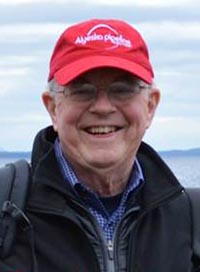
President of Alyeska Pipeline Service Company
I appreciate the opportunity to share with you some of Alyeska Pipeline Service Company’s perspectives as we continue work to keep the Trans-Alaska Pipeline System, or TAPS, economically and technically durable for Alaska’s future, able to safely transport oil that remains a foundation of Alaska’s economy. One major investment we’re making for the future is substantially upgrading the fleet that supports tanker movements and emergency response for Prince William Sound. As transition to our new marine services contractor continues, momentum is building – six modern tugs and barges have already launched, and two tugs completed sea trials in January. We will all see significant activity this spring as vessels and crews begin arriving in the Sound.
Alyeska and Edison Chouest Offshore, or ECO, personnel are already working with tanker and terminal operators, marine pilots, our fishing vessel responders, our regulators and Alaska stakeholders, including the Council, on our readiness to protect the environment, culture, resources and communities of Prince William Sound and Port Valdez. This transition is not simply a matter of one contractor leaving port as another replaces them. Tremendous care and vigilance are guiding transition, led by the Ship Escort/Response Vessel System, or SERVS, team that has ably protected Prince William Sound for over 20 years. Our Valdez-based staff doesn’t just live and work there. Many are from families and communities that have fished and recreated in these waters for generations. This gives us a very strong sense of stewardship.
The transition adds significant operational and safety improvements to our Prince William Sound fleet and our workers. It brings newer technology, which the Council has advocated for, like constant tension winches and vastly improved fit-for-purpose barges and skimmers. The transition builds upon other risk mitigation advances already in place, such as double-hulled tankers.
ECO training and familiarization with the Sound and its residents, TAPS, Alyeska and SERVS began a year and a half ago and has steadily intensified. Incoming ECO boat captains have, on average 26 years sailing experience, 20 years with towing. Together with ECO, Alyeska is implementing a comprehensive training program for the mariners who will operate in our system. ECO captains are already working in Prince William Sound with crews from Crowley, as well as TAPS tanker operators and Southwest Alaska Marine pilots. ECO mariners are learning the specifics of their task responsibilities through classroom and simulator training and hands-on work with SERVS equipment at ECO training facilities. The training tempo will increase as transition continues, and vessels and crews arrive in Port Valdez. The Council has been invited to observe many of these activities.
As we move forward, there are lines that we will not cross, such as training and demonstrating vessels and crews for emergency response in uncontrolled conditions. We share the Council’s commitment to protecting the environment; it is our people who live that commitment on the water every day. At an appropriate distance, tankers and tugs operate safely in heavy weather. However, to purposely maneuver large vessels close to each other in challenging conditions – which any on-water towing or steering drill entails – is inconsistent with a strong safety and risk management culture and does not build or assure emergency response proficiency.
Emergency responders build and demonstrate proficiency at their tasks in controllable settings. Alyeska and ECO have developed a robust plan to safely train crews for Prince William Sound, just like air crews, surgeons, firefighters and mariners routinely and effectively train for emergencies without unnecessary risks. As mariners know, the Gulf of Alaska is always dynamic and never controllable.
We are committed to a safe transition, focused on 24/7 operational excellence, the safety of our people, and protecting our Alaska environment from the North Slope to Prince William Sound. We are excited to welcome ECO, and the opportunity to continue doing what we do best for every Alaskan, transporting North Slope product safely to market. Thanks for your support.